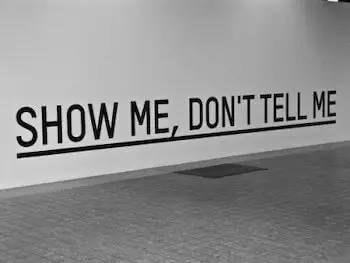To ‘walk the walk’ is to back up one’s talk with action.
Walk the walk
What's the meaning of the phrase 'Walk the walk'?
What's the origin of the phrase 'Walk the walk'?
‘Walk the walk’ is almost always said in combination with ‘talk the talk’, for example, “if you’re going to talk the talk, you’ve got to walk the walk”, or “walk it like you talk it”.
This is a 20th century American alternative to various old sayings which epitomise the notion that ‘talk is cheap’, for example ‘actions speak louder than words’ and ‘practice what you preach’. The context for the use of any of these expressions is in response to what is seen as empty boasting. People who are accused of such are said (in the USA) to ‘talk a good game’ or (in the UK) to be ‘all mouth and no trousers’.
The disdain that unproductive bragging is held in was carried a little further by no less authors than George Bernard Shaw and Shakespeare. They both implied that ‘talking’ was itself an ineffectual alternative to ‘walking’.
In Man and Superman, 1903, George Bernard Shaw suggested that:
“He who can, does. He who cannot, teaches.”
Shakespeare’s Richard III, 1594, includes the character known simply as ‘The First Murderer’ – clearly not a man to be trifled with:
Fear not, my lord, we will not stand to prate;
Talkers are no good doers: be assured
We come to use our hands and not our tongues.
Benjamin Franklin is reputed to have coined the proverbial saying “Well done is better than well said”. I’ve resorted to the weasly ‘reputed to’ there, as, although it is certainly in his style, there appears to be no hard evidence to link Franklin to this phrase. The earliest usage that I can actually verify is a citation from the Ohio newspaper The Mansfield News, June 1921:
“Although he has no gilded medals upon his bosom, Howard Herring of the North American Watch company, walks the walk, and talks the talk, of a hero today.”
More recently, and especially in the UK, where ‘walk the walk’ has never caught on, the phrase is sometimes condensed to ‘walk the talk’. This appears to have derived in the UK as a simple mishearing of the American original. The earliest example of it that I’ve found in print is in an article in The Times (London), from May 1993. This came in an interview with Gordon Roddick, co-founder of The Body Shop cosmetics chain:
“Some of the less friendly observers have determined that we will abandon our principles and reveal ourselves as shallow cynical exploiters. We must disappoint them… quite simply put, we walk our talk.”
An even more recent term, ‘walk and talk’ has been coined for a storytelling device which has been widely used in US television dramas, like The West Wing and ER. It is a tracking shot of a primary character who is approached by various underlings in order to obtain a rushed ‘on the hoof’ conversation. Usually filmed using the rather inappropriately named ‘Steadicam’, the scenes are intended to make the exchange more visually interesting and to imply the busyness and importance of the main character.
The history of “Walk the walk” in printed materials
Trend of walk the walk in printed material over time
Related phrases and meanings
Browse more Phrases
About the Author

Phrases & Meanings
A-Z
A B C D E F G H I J K L M N O P Q R S T UV W XYZ
Categories
American Animals Australian Bible Body Colour Conflict Death Devil Dogs Emotions Euphemism Family Fashion Food French Horses ‘Jack’ Luck Money Military Music Names Nature Nautical Numbers Politics Religion Shakespeare Stupidity Entertainment Weather Women Work
How did we do?
Have you spotted something that needs updated on this page? We review all feedback we receive to ensure that we provide the most accurate and up to date information on phrases.
